The Jews live among us, in silence
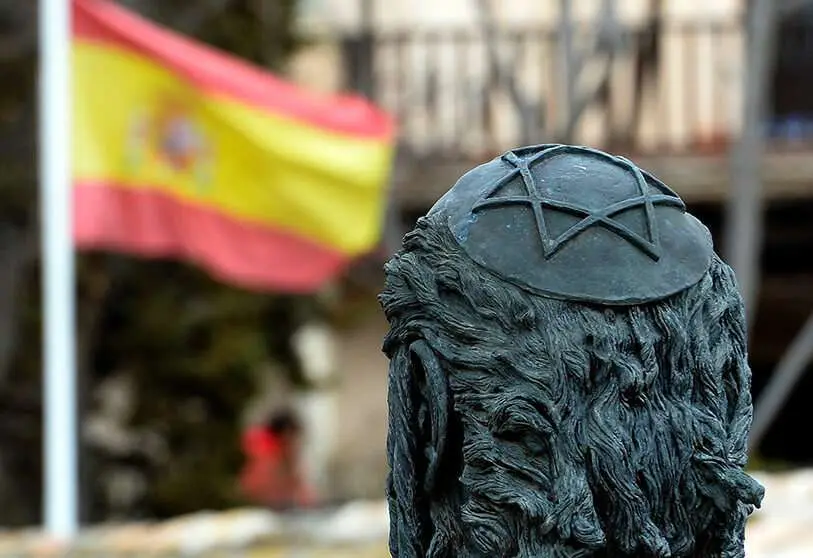
"Spaniards, still until a few years ago, could ask you if Jews had tails and things like that," stated Carolina Alsen, director of the Federation of Jewish Communities of Spain (hereafter FCJE) in an interview for AJC in 2018. Since the expulsion decree induced by the Catholic Monarchs in 1492, the non-existence of a Jewish community in Spain has been assumed. However, the reality is different.
According to data provided by the FCJE, there are approximately 45,000 people belonging to this religion in Spain, with a total of 30 synagogues throughout the country. This figure is insignificant when compared to the total number of parishes counted by the Spanish Episcopal Conference: a total of 22,993 and 1,500 mosques, according to El Independiente.
The problem is twofold: the Sephardic Jews in a diaspora situation who claim Spanish nationality and the prejudices that harass those who confess to the Hebrew religion and the neo-fascist danger.
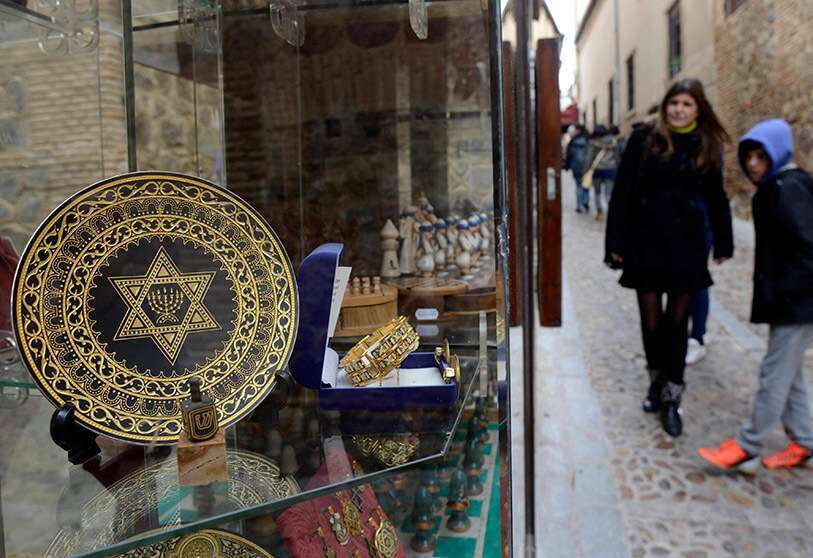
Law 12/2015, of 24 June, on the granting of Spanish nationality to Sephardim originating in Spain, was passed in 2015 during the government of Mariano Rajoy. "The law to grant Spanish nationality to the descendants of the Sephardim seeks to compensate for an injustice 500 years ago, but it is also seen as a mechanism for the Spanish state to attract investors, especially in real estate," says León Opalín in El Financiero. All those who claim to be descendants of Sephardic Jews expelled from Spain must take a test of constitutional and socio-cultural knowledge of Spain (CCSE test) administered by the Miguel de Cervantes Institute in order to obtain nationality. They must also provide a series of documents attesting to their origins.
As of November 2019, the Ministry of Justice and the General Council of Notaries had already received 153,767 applications from more than 60 countries, including Latin America, as well as the United States and Israel, according to the BBC. The granting of a Spanish passport is not a simple procedure; as Alejandro Rubinstein, president of the Genealogy and Demography Committee of the Jewish Documentation Centre of Mexico, points out: "Having a Spanish surname or of Sephardic origin does not mean having descended from Sephardim", something that many individuals are taking advantage of to try to "sneak in" among the chosen ones.
In 2020, the alarm bells rang in the face of fraudulent applications, leading to a tightening of the selection criteria. Whereas before that year 34,000 applications were approved and only one denied, in July this year 17,000 were awaiting a response, as Nicholas Casey points out for the New York Times.
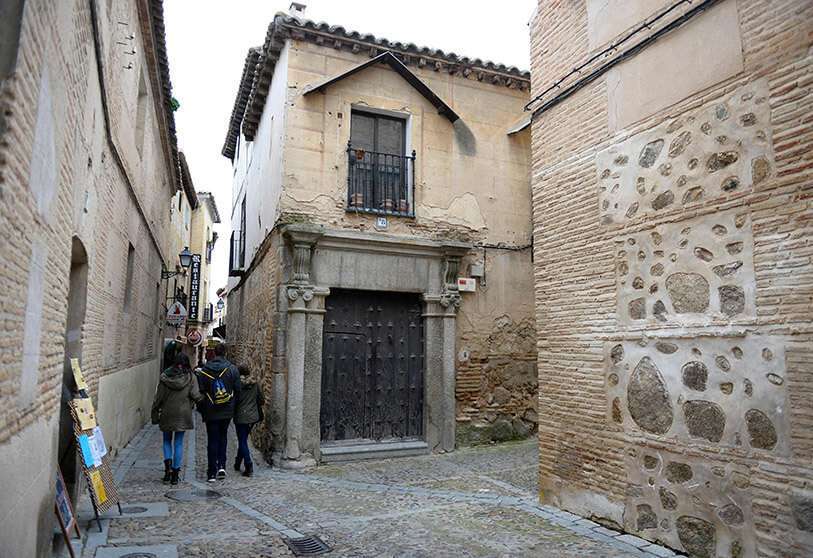
The pandemic has allowed the application process to be lengthened, with September 2019 being the deadline. A total of 63,873 applications have been registered, of which 36,182 have been approved between 2020 and 2021, with 50,000 still awaiting resolution, according to information provided by El País.
Another relevant point to highlight about the reality of the Spanish Jewish community is anti-Semitic manifestations. "Although there is anti-Semitism in Spain, it is not an anti-Semitism like that seen in France or England, where there really are attacks against people", according to Carolina Alsen, director of FCJE. This testimony is reinforced by the opinion of León Opalín in El Financiero, "In contrast to what is happening in Spain, thousands of Jews from France, England, and Europe in general, are "fleeing" their countries of residence in the face of increasingly violent manifestations of anti-Semitism".
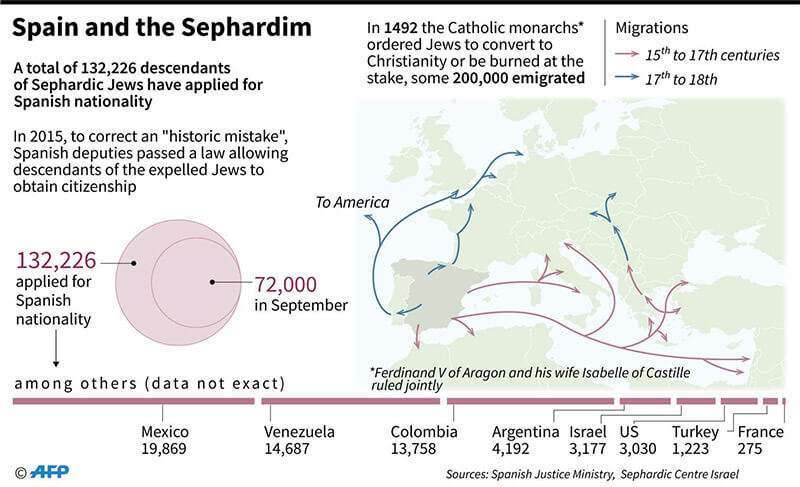
It is vitally important to distinguish between the concept of anti-Semitism, which refers to hatred towards Jews, and anti-Zionism, which refers to the opposition of the political current that defends the legitimacy of a Jewish state on Palestinian territory.
As happens with other minorities, in this case representing 0.1% of Spain's population, they receive feelings of hatred and rejection from certain groups. Among the main anti-Semitic messages are Holocaust denial or historical cultural prejudices. According to the Eurobarometer published in January 2019 by the Observatory on Antisemitism 66 per cent of Spaniards do not believe that denying the Holocaust is a problem compared to 38 per cent on average in the European Union.
The latest anti-Semitic incidents published in the recently mentioned Observatory, are aimed at street graffiti of "Free Palestine" on a synagogue in Ceuta or the informative headline "Zionist terrorism in Palestine" by the city council of Oleiros in A Coruña. Is there confusion between the term anti-Semitic and anti-Zionist on the part of the Jewish community?

Of particular relevance was the neo-Nazi demonstration in Madrid last February in homage to the Blue Division. Statements such as "The enemy will always be the same, albeit with different masks: the Jew. Because nothing is more accurate than this statement: the Jew is the guilty one", are a clear example of the danger, increasingly on the rise, coming from the neo-Nazi ultra-right.
The Israeli-Palestinian conflict plays an important role in the picture. "On the whole, most Spanish public opinion is neutral, although clearly the pro-Palestinian position is much more visible in public life than the opposite", as Carmen González Enríquez analyses for the Elcano Royal Institute on the basis of the study conducted by the Pew Global Institute in 2015; "Rejection of the position of the State of Israel in its conflict with the Palestinian population can sometimes be expressed in such a way that it is confused with rejection of the entire Jewish population in the world", she adds..
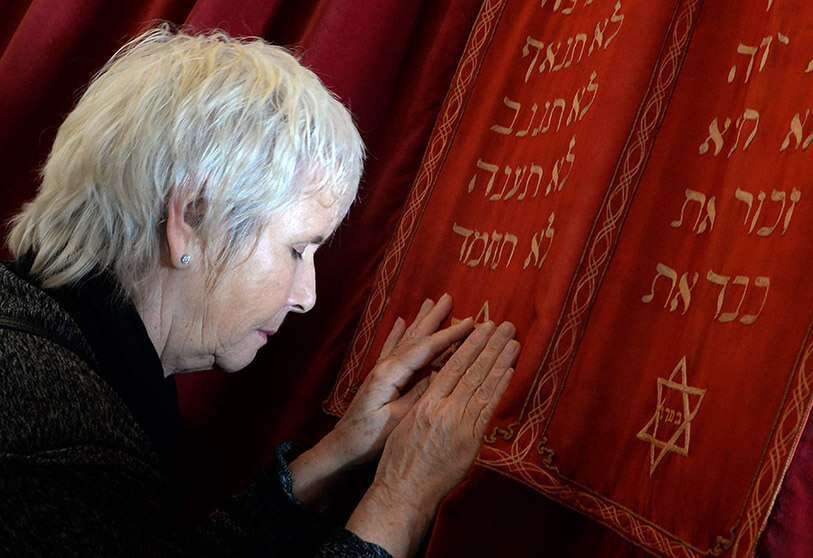
This is how Spanish Jews find themselves, both inside and outside the country. The promise of a dual nationality, the fruit of ancestral roots, is a long time coming. The rise of the extreme right and the violence that has taken place on Israeli soil condemns the day-to-day life of the Jewish community. The difference between anti-Semitism and anti-Zionism, for the sake of freedom and the defence of all human rights, has yet to be established for many, even today.
Summary 1: "Having a Spanish surname or a surname of Sephardic origin does not mean having descended from Sephardim".
Summary 2: 66% of Spaniards do not believe that denying the Holocaust is a problem compared to 38% on average in the European Union. (Eurobarometer January 2019)








